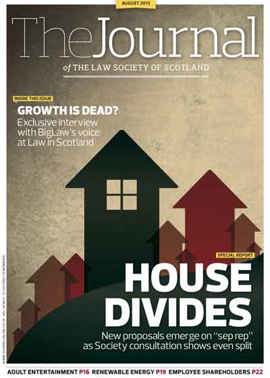Residential property review takes shape

What was the motivation for setting up the working party?
Basically, it became clear during the debates on separate representation that it is difficult treating that topic in isolation, and a feeling grew that what would be classed as the whole area of traditional residential conveyancing really should be looked at and reviewed for the 21st century. There’s an onus on the Society to be proactive, to try to consider this whole area to see what it can do not just in terms of lenders and borrowers, but a whole 360˚ review.
Who are the members?
What we’ve tried to do is get a working party of nine or 10 people, not just time-honoured conveyancers but people who represent a commercial view, academics plus small, medium and big-sized firms as far as residential conveyancing is concerned. We are also trying to get someone to represent the public interest. We’ve got most of the members on board but are still looking for one or two for the public interest.
What is your remit?
Essentially to review the whole practice and procedure of residential conveyancing as it affects the provision of services by the profession to the house buying and selling public. It’s pretty wide ranging. It mostly concerns practice because we have no locus to do anything about the law, but obviously if we see a particular issue it may be part of our final recommendations that we should engage with Holyrood to try and change that aspect of the law. But that would most likely be miscellaneous issues; we hope that mostly it will be things we can implement without waiting for legislation first.
What particular issues will you focus on?
Nothing is ruled in or out, but certainly we will have to look at the factors causing delay in concluding contracts, at issues of service and quality, benchmarking what we can provide in terms of service and quality to our clients, at the whole area of branding as Scottish conveyancers, at how IT fits into aspects of service and procedures. There are some big areas.
On branding, the question would be, do we want to create some sort of badge in terms of a quality mark for Scottish conveyancers? The big issue will then be, will all Scottish solicitors, by virtue of having a practising certificate, obtain that badge, or would there be criteria that applicants would have to meet? At the moment we don’t have any accreditation for residential conveyancers: should we look at accreditation or something more robust, whereby you have a quality mark maybe not dissimilar to what they have in England?
Is the system in a mess at the moment? Why is that?
There are clearly problems. For example, there is a huge reluctance on the part of solicitors to advise clients to conclude contracts at the moment, particularly in relation to funding. There was a letter in the Journal just a month or two ago talking about it: there seems to be huge concern about not getting your client to commit until the last possible moment, just in case something happens, whereas one could argue that is possibly an overreaction to the problems that arose when the credit crunch came in five years ago, where loans were pulled at very short notice. Is that a real problem still? Prior to the credit crunch we would quite happily advise clients to sign up to missives if a loan wasn’t in place. Should we bring that back in now?
Should we be looking at other national initiatives such as national standard missives? At the moment we’ve got a variety of local standard clauses: Combined, Aberdeen, Tayside, Highland; shouldn’t it be in line with the times for the Society to try and create a national set of clauses?
How enforceable will any changes be at the end of the day, if they are simply dealing with matters of practice?
I imagine it will be a mixture of carrot and stick, in the sense that it may require some sort of rules, possibly to reflect levels or standards of service. For example, we may have to look at a national letter of engagement for conveyancers. At the moment the client communication rules are very basic, only about four cardinal points that you have to cover. But equally, Professional Practice has been saying for many years now, if there’s a problem, put it in your letter of engagement, and it may well be very beneficial for all practitioners to create a set of national terms of business that can be publicised and that the consumer may well be aware of. That may involve firms in signing up to things that they may not always be comfortable with, for example IT provision – there are still some firms that are reluctant to use emails, in relation to conveyancing anyway – and maybe that is something we will have to look at.
Where does this fit in with separate representation? Should we be running this review first, as the CML has argued?
“Sep rep” goes back to a basic issue of principle involving conflict of interest, and on one level it’s clearly a standalone issue. But in debating that, a lot of agents are saying, this is going to create more delay, more hassle for an average transaction. So what we’re asking is, is there such a thing as an average transaction? What can we do to enhance the average transaction for the average consumer? What is within the remit of the solicitor to assist in this process?
The fundamental point that we start from is that there is no fundamental right for a solicitor to be involved in the house buying and selling process. All we have is a reserved area to draft dispositions. Anyone else can do missives or something else within that area. So going back to basics, while lawyers have from time immemorial been involved in the process, and we like to think that since time immemorial we’ve done a fairly good job, as is reflected in the levels of satisfaction in all the surveys reported back to us, you have to start from the premise that in the current world, nothing lasts for ever. So we have to ask, can we improve what we provide to our clients, to ensure that the house buying and selling public are happy with the service that they get, and that we have a place in that process.
The key aspect of sep rep is the conflict of interest and that will stand alone. The difficulty in simple practical terms is that this working party has been given a two year remit in essence by Council, and there are lots of big topics in there that will demand a lot of discussion. To try and put sep rep into the long grass for that length of time, I don’t think that is going to assist.
Is IT going to shape your views on what should be good practice going forward?
We’ll certainly look into it. E-conveyancing has been on the agenda for many years; we have the Registration of Title Act coming in which provides for e-documents and e-missives – that could be in place by the end of this year or the beginning of next, and that will immediately be a change in terms of IT requirements. ARTL hasn’t gone away; Registers are working up ARTL 2, and that will be coming in as part of the whole registration reforms next autumn: what will be the expectation of firms in that area? I don’t think we’ll be saying, firms must use ARTL, but what would a consumer, a client, expect their firm to be able to do?
When and how will the profession and public get the chance to have their say?
The working party has only had one meeting so far, and is about to have its second, but one of the things we are looking at is drawing up a list of consultees: third parties, other firms, the consumer lobby and others. Many have already been in touch saying they want to speak to us about this, so we will try and do that. There will be a chance for everyone to have their say. This article will flag up to the profession that this is happening; the hope is that it will get momentum and so people will be coming to us with their views. We’re still working up the methodology. We’re going out for some initial views to a wide range of people; if some people have their own views they want to input, we’ll be delighted if they write in to Drumsheugh Gardens, to the secretary of the Property Law Committee. But at some stage we’ll have a wider ranging questionnaire that all members can feed into.
What use will be made of the outcome?
Certainly if there are any radical changes it will come to the AGM for debate, but we’re a long way from that yet. We’re still trying to focus our thoughts ; we have to do an initial report after six months, and I suspect that will be very much bullet points of what actions we can take going ahead. And we’ll try and put timescales on that – some will be easier to implement than others.
In this issue
- Widening access to the stocks and gallows?
- Family migration revisited
- The same but different
- Controlling tendency
- ESPC: out of the parental home
- Offshore employment: floating goalposts?
- Reading for pleasure
- Opinion column: David O'Hagan
- Book reviews
- Profile
- President's column
- Make the most of your "multiples"
- Sep rep: all to play for
- The bigger they are...
- Licensed to thrill
- Capacity challenge
- One year, and counting?
- Selling your rights... for what?
- The voice of technology
- A serious matter
- Relocation: where are we now?
- Whistle for reform
- Same sex marriage: for richer, for poorer
- Scottish Solicitors' Discipline Tribunal
- Residential property review takes shape
- In-house lawyers seek a rising star
- Mentoring: the way forward
- How not to win business: a guide for professionals
- Comm prop risks
- Ask Ash
- Crossed purposes
- Conference looks for profession to evolve
- Law reform roundup
- Help with the red flags






